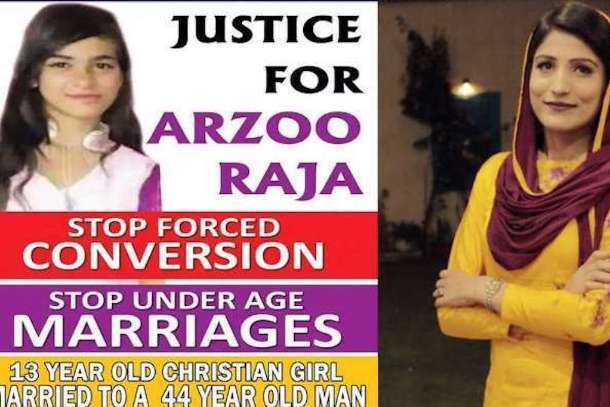By AYJAZ WANIJust a day before the Covid-battered year 2020 ended, a mob led by local leaders of a religious party vandalised a century-old Hindu shrine in Karak district of Khyber Pukhtunkhwa (KP). The mob of more than 1,000 people set the shrine on fire. They did not even spare an under-construction house owned by members of the Hindu community. The incident occurred in the wake of the permission granted to the minority community to extend the temple. The administration and police remained silent spectators as the mob went about vandalising and setting fire to the premises. The police arrested 24 people for the arson only after outcry from human rights activists and the minority Hindu community. The incident also caused global embarrassment to Prime Minister Imran Khan’s PTI government, prompting Noorul Haq Qadri, the Minister for Religious Affairs, to condemn the attack, saying that the incident was “a conspiracy against sectarian harmony”. The supreme court of Pakistan, during the hearing of a plea from Hindu lawmaker Ramesh Kumar, directed the Evacuee Property Trust Board (EPTB) to start reconstruction of the temple and directed submission of the details of all non-functional and functional temples and Gurdwaras in Pakistan. The police chief of KP, who was also present at the hearing, told the court that 92 police officials, including the superintendent of police and his deputy, were suspended after the incident and 109 people involved in the incident were arrested. The Chief Justice of Pakistan also directed the EPTB to clear all the encroachments from minority religious places and take actions against the officials involved in such incidents. Same is the case of other Muslim minorities like Shia Hazara, who continue to face the wrath of the state, terrorists as well as other sectarian groups from time to time. On 4 January, 11 members of the Shia Hazara community working as coal miners were killed by unidentified gunmen. Their relatives protested for four days in Quetta and demanded a visit by the Prime Minister. Pakistan’s minorities always live under the cloud of insecurity and fear. They are demonised. The plight of the minorities has not changed even under Imran Khan’s rule, who champions himself as a messiah of minorities and criticises other countries on the same issues.
Equal citizens… From the time Imran Khan took the office of the Prime Minister, he had persistently claimed that minorities in Pakistan are equal citizens and were under state protection in many of his tweets and interviews. However, much of his words have remained mere lip-service. Like his predecessors, Imran Khan too seems to have caved in to pressure from the Islamists. In 2018, soon after Imran Khan became the PM, he was forced to revoke his decision to remove a globally renowned scholar from his Economic Advisory Council (EAC). A Princeton University professor and economist Atif Mian of prosecuted Ahmadi religious community was chosen to be a part of the 18-member EAC. Just hours after the announcement, Islamists, Tehreek-i-Labbaik Pakistan (TLP) and other opposition parties objected to his faith and started a vilification campaign against him. Such was the hateful campaign against Atif Mian that Imran Khan’s PTI government revoked his appointment within days. The government initially tried to defend the decision when Information Minister Fawad Chaudury said, “Pakistan belongs as much to minorities as it does to the majority… we will not bow to extremists”. Ironically, the minister continued to insist that the government wants to work with all sections of society, including Islamists, even after Atif’s ouster. Govt toothless. The government has historically remained toothless when it came to Islamists. Following the bomb blasts of 2013 at the PeshawarAll-Saints Church, the then Chief Justice of Supreme Court asked the government to set up the National Commission for Minorities (NCM). The NCM was eventually launched in 2020 with six official and 12 non-official members, including the chairman for a term of three years. Among the 12 members, three memberships each were reserved for Hindus and Christians, two each for Sikhs and Muslims and one each for Parsi and Kalash communities. The NCM has largely remained ineffective and often been criticised by human rights activists. Most of the religious minorities and their homes, religious places continue to be targeted by Islamists under the pretext of the infamous blasphemy laws. Forced conversions, hate speech and discrimination remain unchecked. Instead of taking stock of the worsening situation of its own minorities, the NCM has been used by the PTI government to discuss the minority rights and discrimination faced by religious minorities across the border. Since its establishment, the NCM has come to be seen as merely a political gimmick of the government rather than doing any good for the minorities at home. Over the years, the laws and rights of the minorities have seen a gradual shift from neutrality to blatant discrimination. In 2016, the Sindh government tried to outlaw forced conversions and marriages but failed because of the criticism and opposition from religious parties. A revised version of the bill was introduced in 2019 but was again withdrawn following protests from Islamists. In March 2019, 2,000 Hindu minority members held protests, demanding justice for two sisters, Reena and Raveena. The Hindus claimed that the two sisters were forcefully converted and married. But the Islamabad High Court ruled out conversion. Between 2013 and 2019, 156 forced conversions have reportedly taken place. Pakistan is a signatory to the Universal Declaration of Human Rights that includes the right to freedom of religion. Still, the government has failed to comply with these international obligations and protect the minority non-Muslim women from exploitation.
https://www.orfonline.org/expert-speak/pakistan-minorities-under-imran-khan-govt/


No comments:
Post a Comment